Abstract
It is highlighted that in the theory of systems each science is a model, i.e. a conceptual structure reflecting certain aspects of reality. The article therefore shows that the theory of systems’ methodology allows to create information models for those areas of humanitarian knowledge and education which have not yet been involved in structuring and systematization processes in the area. It is demonstrated that the development of models will lead to structural and semantic ordering of huge volumes of information (to demonstrate, cases of building information models in philosophy, evolution (ontology) and culture (axiology) are used). This, in turn, will raise the level of comprehension of definitions of basic concepts and categories and significantly improve the quality and accessibility of education, as well as the effectiveness of educational systems. To further advance the proposed method, it is necessary to create the "alphabet" of concrete information models, as well as to develop a methodology that allows creating both concrete and general information models.This way we will overcome the crisis that encompasses the whole complex of human interaction with nature; will change the leading to self-destruction regulatory attitudes and value orientations that have formed in modern civilization. The approach will allow switching to co-evolutionary interaction of a person with nature, development and introduction of safe for the environment technologies. This will come in place of bias towards continuous, progressive development at any cost and will allow to replace the domination and bad management with coordination and cooperation.
Keywords: Consciousnesseducationinformation modelsprocesssystemstructure
Introduction
The goal of education – formation of conscious attitude to life
First human beings on our planet, while performing their human activities, started to gradually give names and definitions to a small number of objects from the infinite plethora of diverse processes in nature. After the emergence of thinking, memory and language, a human has obtained the opportunity to include that social and cultural experience, which can be conveyed not only by "learning" skills, but also through words and legends, into the volume of transmitted knowledge.
By acquiring the understanding that the words spoken by a person consist of sounds and it is possible, by marking the sounds with letters, to put words down on different mediums, people simultaneously got the opportunity to transmit thoughts on long distances, provided that the recipient is literate; thus, the need to train a younger generation in formed. At the time printing was invented, it became clear that in this way it is easier and more reliable to transmit the accumulated "eternal truths" to future generations. However, the intended recipients of these values, the ones who
After science and education crystallized into an independent type of human activity, an understanding emerged that science and the scientific community are such a sociocultural environment in which a new kind of person is formed, a self-conscious person. Self-consciousness is a form of human activity which involves creating new scientific knowledge. Therefore, the process of education
Education is a key to sustainable development, peace and stability
The phenomenon of Mowgli children shows that each human trait possessed by a human is not inherited, but is acquired in the process of communication and interaction between people, in the process of teaching skills and abilities about the use and development of cultural achievements. However the more knowledge accumulates in the social memory of mankind, the longer the learning period becomes, the more there are particular courses and disciplines, and the more expensive getting a degree becomes.
The education system that we inherited from the past century is too rigid. It did not withstand the impact of the scientific and technological revolution, the information and demographic explosion. As a result, all countries abandoned free higher education. However, education, being one of the basic human rights, is the key to sustainable development, peace and stability both within and between countries, and is therefore an indispensable means for the conscious and effective participation of a person in the life of society. All countries are characterized by the same problems in the field of education. The missing are high quality and accessibility, continuity and openness of education, the effectiveness of educational systems (Biryukov, 2009).
Problem Statement
The systemic crisis is a harbinger of the dominant world view renewal
Over the past 35 years, the earth's population has increased from 4.5 to 7.5 billion people. 3 billion people, which is 40% of the nowadays population, consists of people under 35 years old. When looking for what is the main cause of all human problems, it seems that the cause is a sharp increase in the population. But the current demographic transition (the rapid decline in population growth rates over the past few decades) is taking place simultaneously with the resource base growth. All previous recessions in the quantity of population were caused by increased mortality due to wars, famine, epidemics. The current decline is due to a qualitatively different reason – a sharp decline in the birth rate.
Its origins are rooted in the regulatory attitudes dominant in our culture. The former determine the dominance of certain value orientations that have emerged in the world: firstly, it is the orientation towards continuous progressive development. Secondly, those are predispositions to dominate, manage, and control (Kapitsa, 2004). The condition in which humanity is found now many researchers call a “system-wide crisis”. They underline that we live during a period in the existence of mankind when the very basis of life might change. The development of science at the present stage is also characterized by a colossal growth in the volume of information, in which contradictions inevitably accumulate and grow (especially so in humanitarian knowledge and education). Of course, the solutions to many problems are getting more and more elaborated. But figuring out the main way out of the system-wide crisis can only be performed using the full potential of science, which has a strong predictive power.
Is not the first time that mankind finds itself in such a situation. There was always a way out, and it was – to systematize knowledge through the construction of information models. The most striking examples of constructing such models are the following: the postulates of mathematics, the laws of classical physics, the periodic table of chemical elements, various economic models.
Systemic approach changes the methods of cognition
2300 years ago two skeptics, Clitomach and Carnead, "took up arms against beliefs in deity, magic and astrology, which were increasingly spreading. They developed a doctrine of the degrees of probability to assess the "quality" of knowledge and the application of probability in practice, because prudence requires acting according to the most probable hypothesis possible" (Russell, 1959). In modern science, probability theory is regarded as a mathematical science about the laws of a variety of random events. Accordingly, the key to understanding probability is a particular systemic vision of the world, its structure and evolution, which changes the forms of expression and organization of knowledge (Sachkov, 2006). Making representations of systems accompanied the entire development of knowledge, but the study of complex systems changed the ideas about the systems themselves. In the system approach, the methods of understanding the integral characteristics of systems that have come to be regarded as having an integral character and depending on the features of the structural relationships, are changed.
The basic concepts of the system approach are the concepts of structure and hierarchy. The hierarchy in the system manifests itself in both "structures" and "functions." It is closely connected to evolutionary issues, and the issues of measures of organization. Among all complex systems, only hierarchies have enough time for development, therefore any self-organizing system is a hierarchical structure (Bertalanffy, 1969). In biological hierarchies, subordination manifests itself in the form of control, in the implementation of which an important role belongs to the action of feedbacks. The leading principles in biological hierarchies are elements of coordination and cooperation, rather than domination and subordination (Engelhardt, 1984). Let us single out in the theory of systems the term "general theory of systems", introduced into use to designate such a level of theoretical modeling, which is located somewhere between extremely abstract constructs of pure mathematics and concrete theories of special disciplines (Boulding, 1969). Information model (or information-logical model) is a model of an object, phenomenon or process, consisting of many elements, concepts or definitions, represented in the form of images and relationships between them.
Research Questions
The pyramid of knowledge
Social and cultural experience acquired through multiple trials and mistakes in daily practice is systematized and processed in scientific process, and then is returned to practice in the form of theoretical knowledge and new technologies, where its effectiveness and selection are evaluated. Philosophy stands out in the system of sciences in that it provides the highest level of abstraction in the hierarchy of human activity. By the power of its generalizing methodology it makes it possible to compose a single picture of the world from various concepts of particular sciences and to separate concepts incompatible with the general picture. Consequently, philosophy performs the functions of feedback in relation to all other sciences (Fig.
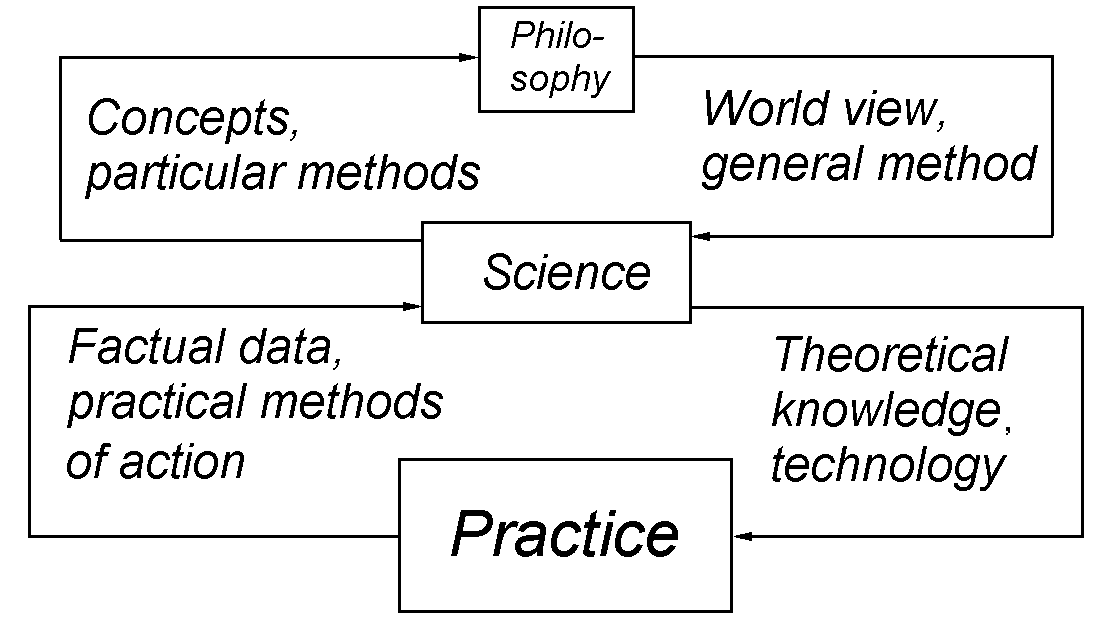
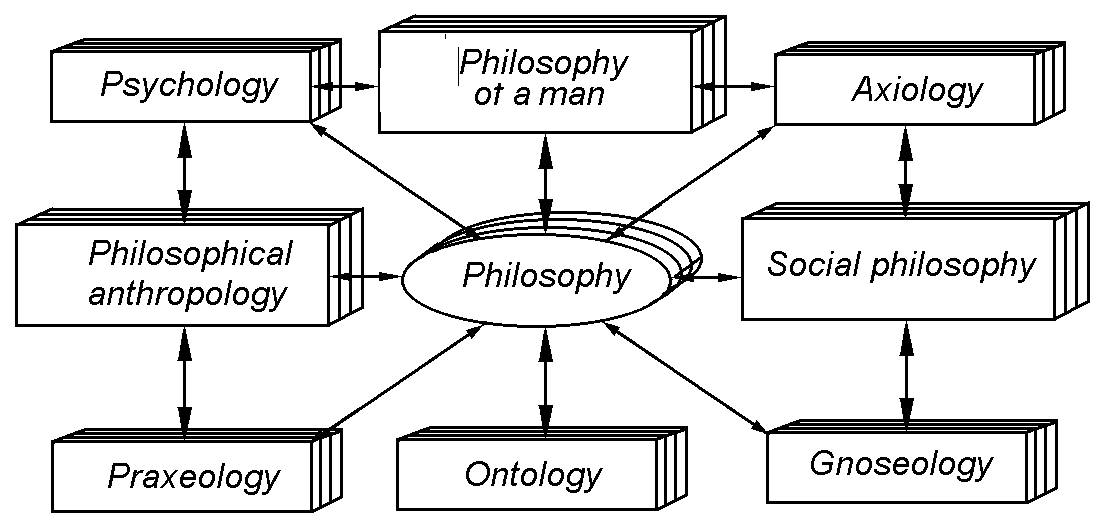
A number of thinkers believe that philosophy is a form of social self-awareness, a special form of spiritual development of the world, expressed in ideological reflexivity and oriented toward the activity side of human existence, to public practice. The imperative nature of philosophical knowledge is very important, since it is not only knowledge of the existing, but the realization of what is due, is the theoretical justification of the social ideal. A person is asked questions, the theoretical answers to which are designed to orient his thinking and action for the benefit of society, humanity, and therefore, the questions must correspond to the objective processes of reality.
Society always has a certain (sufficient or inadequate) ability to neutralize dangers. It also has (or does not have) the potential to increase its ability to reproduce itself and evolve against the backdrop of continuously emerging dangers and increasing complexity. This process, which is of growing importance, determines the nations’, countries’, states’ and humanity’s “to be or not to be”. It includes the ability to philosophize, which can be called the form of this process. The main task of philosophizing is to formulate questions to adequately articulated dangers of a more complex reality at each stage of the development of mankind, and find answers to them that possess the following traits:
firstly, they create the basis for the viability and stability of society;
secondly, they determine the strategy and direction of the development of society;
thirdly, they provide a person with the possibility of creative self-realization, going beyond the existing notions of necessity (Akhiezer, 1995, p. 17-18).
Subject field of philosophy
In translation, the word philosophy means "love of wisdom". Only a human being can ponder and philosophize. Consequently, the term "philosophy", can be used in combination only with the words “a person” or “a community”. That is, only the following word combinations are meaningful: human philosophy, social philosophy, philosophical anthropology, and their analogues. In all other cases it is necessary to return to the term "philosophical grounds".
In Russian language any other word constructions, such as: philosophy of law, philosophy of science, philosophy of culture, philosophy of technology, distort the meaning of this most important concept, mystify it, creating the impression that law, science, culture, technology and other social structures and institutions are thinking and evolve independently, together with the person and his consciousness. However, the main difference between the evolution of ecological systems in the natural environment and the development of man in an artificial cultural environment is that man must equip his second nature consciously. Thus, in constructing an information model, the following structure of philosophy or the objective internal division of philosophical knowledge is obtained (Figure
Just as in natural and biological structures, in all social structures, subordination must be carried out in the form of constant coordination and control, in which the main role is played by the action of feedback. But these connections in all social structures must be conceived in a timely manner by the people, organized and reconstructed consciously. They should act and point out to the approaching danger long before an organization, a country or mankind in general finds itself on the brink of death.
So, according to the textbook “Philosophy”, ed. by prof. Mitroshenkov (2002), which is selected for comparison with the content of developed here information models, in modern philosophy, the following sections are distinguished:1) the history of philosophy – philosophical doctrine of the emergence, formation and development of philosophical knowledge;2) ontology – philosophical doctrine of being of oneself, and its most common properties; about ways and forms of existence;3) gnoseology – philosophical doctrine of about knowledge, cognitive activity, sensory and rational levels of cognition;4) epistemology – the doctrine of the logical level of cognition, theoretical thinking, truth and the ways of its comprehension; 5) social philosophy – the doctrine of society, its essential characteristics and patterns of development;6) philosophical anthropology - the doctrine of a person, her destiny, the meaning of life and the ways of worthy living;7) philosophical axiology – the doctrine of values, i.e. about what matters to man, about the existentials of human existence.
There is also a number of philosophical disciplines, which, having arisen in the bosom of philosophy, gained the status of independent disciplines. Such are: ethics, aesthetics, logic, philosophy of law,the philosophy of science. We can also mention the philosophy of culture, the philosophy of history, etc. (Mitroshenkov, 2002, p. 30-31). One of the sections of the aforementioned textbook is called “The Philosophy of Man”, which addresses, among other things, such questions as: The problem of a man in the history of philosophical thought; philosophical anthropology as a scientific discipline and its subject; a man as a person; mechanisms of socialization of an individual. In the list of sections the philosophical anthropology is mentioned. That is, the authors did not succeed in isolating the philosophy of man and philosophical anthropology into separate sections. Also, the whole content of the textbook is permeated with the understanding that the whole of philosophy – everything human in a man, is based on the action side of human existence, on public practice. But the authors of the textbook did not isolate praxeology and psychology into separate sections or chapters. As we see, the result of the construction of the information model, to which philosophers have been going for tens of years, was obtained, with some completely explainable discrepancies, in tens of minutes. And students of the senior classes or simply students with common sense can understand, remember and, if necessary, reproduce this.
Construction Of The Model Of Evolution (ontology)
Consider, for example, the construction of an ontology model. By carefully studying "Levels of organization of matter (according to T. Miller)" (Figure
Let us also combine several concepts in the Elements column, because for them there are no corresponding concepts in the column “Environment”. Also, obviously, the concepts such as Planet and the Earth will fall into the “Form” column as components of the Solar system. Let us fill in the missing concepts in the Form column, and add to the table the well-known notions of a cultural-artificial environment, taking into account the interactions and connections between them. We will get the model of evolution, shown in the Fig.
The central axis of the ontology model is the duration of the evolutionary processes of various forms of development. On the axis, the known science facts are presented: the age of the Sun, the anthropological data, the time of the invention of writing, Galilean science, etc. Built on known concepts, the model makes it possible to clarify the definitions of all the concepts making up the model, allowing one to "read" definitions of concepts from the model itself.
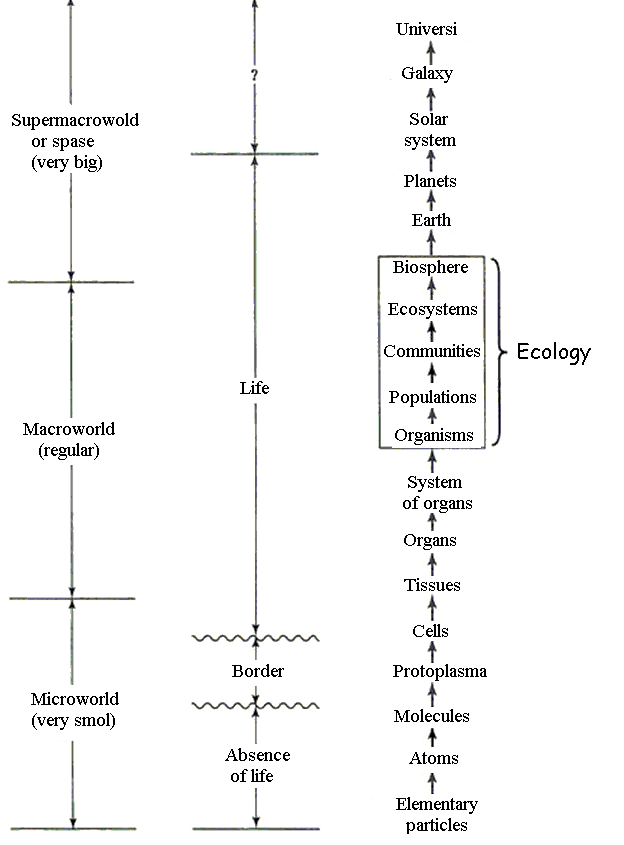
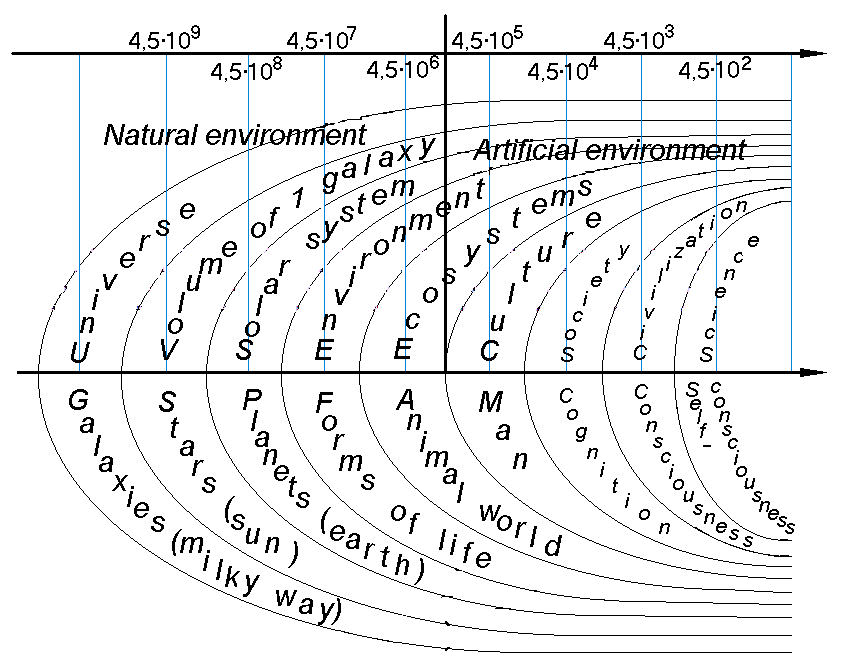
It is also possible to give different definitions to the aforementioned terms.
Let us continue to give definitions, according to the interconnected pairs in the model (Figure
If we introduce the term “elements” into this model, it may be represented by Table
Purpose of the Study
Building the methodology of information-logical models
The aim of the research is to show that the theory of systems’ methodology allows to create information models for those areas of humanitarian knowledge and education which have not yet been involved in structuring and systematization processes in the area. A model of an object, phenomenon or process, is called an information (information-logical) model when it consists of many elements, concepts and definitions and is represented in the form of images and relationships between them. It is demonstrated that the development of models will lead to structural and semantic ordering of huge volumes of information (to demonstrate, cases of building information models in philosophy, evolution (ontology) and culture (axiology) are used).This, in turn, will raise the level of comprehension of definitions of basic concepts and categories and significantly improve the quality and accessibility of education, as well as the effectiveness of educational systems.
Research Methods
Theoretical precursors of the language of the information-logical models
The first was developed a model of culture (axiology) (Fig.
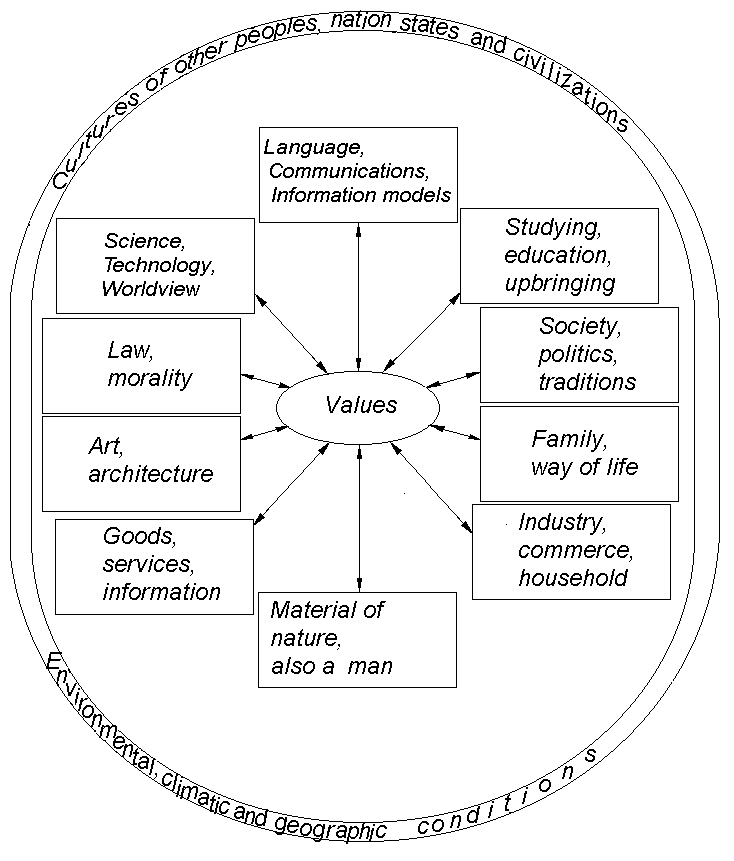
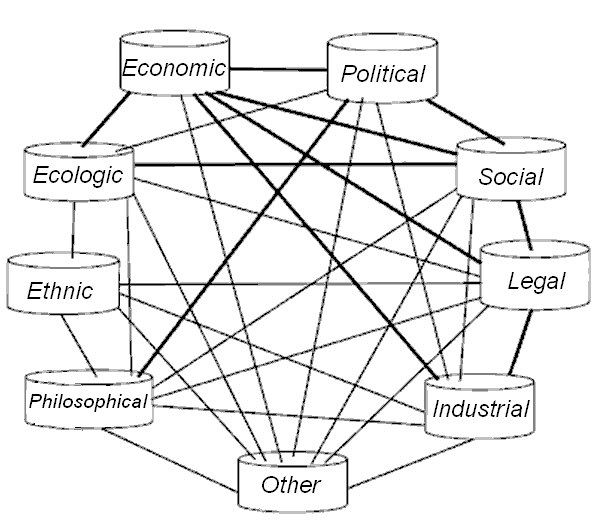
Further the main conclusions of the Leshchenko’s (2004) paper are presented. "In the theory of systems, not only physical, chemical, biological and other phenomena of the natural-science field are considered, but also processes that are the object of consideration of the humanities. Here, too, are categories, concepts, definitions in pure form and a presented in a fairly quantitative manner. And just like in the case of physics, here we are dealing with models, i.e. conceptual structures of such sciences as economics, sociology and political science. In the theory of general systems it is assumed that there can not be a universal system applicable in all cases of objects’ systemic representation. On the other hand, it is assumed that it is possible to transform existing models of heterogenous systems into the form in which it is possible, within certain boundary conditions, for example, spatial and temporal, to create a model reflecting some aspect of the universe from several such systems connected among themselves.
Ideally, there should be a set of models of heterogeneous systems from which one can select dominant ones and create models that reflect the perception of various aspects of the universe within the existing knowledge. An example of a general system, which is an interrelated model of heterogeneous systems, is the culture model shown in Fig.
"A set of basic algebraic operations and a set of relationships specifically for each system are determined by its type or nature. The use of the concepts of universal algebra is applicable to the representation of each of the heterogenous systems: philosophical, ecological, economic, social and others. All the conditions for this are created both by the development of mathematics and by the various fields in which it is applied. An example of this can be the emergence and development of the theory of fuzzy logic and its application in various areas of human activity" (Leshchenko, 2004, с. 314-316).
Findings
The understanding of things happening should go ahead the process of complication of the world
Philosophy, as the most generalized response of mankind to the challenges of history, though always refracted through the philosopher's personal experience, emerges when the inadequacy of previous answers, traditional types of knowledge and behavior becomes evident. This becomes possible only when people constantly improve and deepen the universal basis of comprehension.
This process should not lag behind the complication of emerging problems, rather, it should be ahead of them. Philosophy is a certain kind of logic and, arising as a problem of its own, is at the same time a problem of humanity, which is in need of ever deeper goals and more sophisticated meanings, of deeper understanding of the conditions of its activity in the world (Akhiezer, 1995, p. 17-18). .
Conclusion
Information models give way to effective and accessible education
The separation of knowledge and education into the humanities and the natural sciences, so that each area of knowledge has its own system of concepts about the same objects of the real world, is not only unnatural and unscientific, but also harmful. It violates one of the basic human rights to receive scientific education and reliable information. The way out is to systematize and structure the content of the humanities, which will lead to the emergence of a new worldview, an updated classification of sciences and elimination of major contradictions. The content of education will appear in the form of system models that reflect both the structure of the object and the functional dependencies between the constituent elements of the object. In the education system that forms a meaningful attitude of a person to life and the results of their activities, the main goal will be to apprehend the learning skills and engage in effective intellectual activity. Neither the fall of morals in society, nor the threat of creationism in education can not be prevented with the help of sermons about morality. It is necessary to structure and compress the content of education using the language of information models to reinterpret concepts, revealing the relationships between them.
The aim of education should be to become a scientific worldview and to awaken people’s self-awareness, ie. understanding that each step, each thought of a person not only an action, by that she actually molds herself. Not be a threat of punishment and a legal system, that everywhere opposes any manifestations of violence, should stop people from doing illegal activities, but a clear understanding, in what manner a person is forming herself, committing immoral acts, that “prople will treat me like I treat others”. Thus, the very forms of human development of man, and the environment of his origin, development and existence, and all knowledge, all social structures, all cultural values – are the result of people's communication and interaction, the product of social relations. And all the achievements of mankind, from inventing a simple stick used for some purpose, to the moral foundations of living in a society, are built on the fact that people understood that in this manner he would satisfy his needs easier, faster and more efficiently, continue the human life on Earth, protect his species.
In a short historical period, a rapid change in the socio-economic formation in many countries has happened. The main value is now mental work along with physical labor. A man has acquired an understanding that one can train and develop not only muscles and feelings, memory and thinking, but also consciousness and self-awareness; that science, education, social structures, as well as the whole culture, need to be arranged in such a way that in pursuit of mirages people do not destroy themselves along with all living creatures.
Acknowledgments
The author expresses his gratitude to all the teachers and students of the Samara Regional Academy of Nayanova (Nayanova University) who participated in the work of the Philosophy Club, where the thoughts and ideas presented in this article were born in heated debates.
References
- Akhiezer, A.S. (1995). Ob osobennostjah sovremennogo filosovstvovanija (vzgljad iz Rossii) [On the peculiarities of modern philosophizing (view from Russia)]. Questions of philosophy, 12, 17-18.
- Bertalanffy, L. (1969). Obshchaja teorija system – kriticheskiy obzor. [General Systems Theory - critical review]. In V.N.Sadovsky & E.G. Yudin (Eds.) Investigations on the general theory of systems. Collection of translations. (p. 27). Moscow: Progress. [in Rus].
- Biryukov, A.V. (2009). Pedagogicheskie osnovanija innovacionnoy dejateljnosti: ot kuljturi znanija k kuljture predprinimateljstva. [Pedagogical foundations of innovation: from the culture of knowledge to the culture of entrepreneurship]. In A.V. Biryukov (Ed.) Digest of articles. Education and global development: uniting the world through knowledge. (p. 39). Samara: SSC RAS. [in Rus].
- Boulding, K. (1969). Obshchaja teorija system – skelet nauki. [The general theory of systems is the core of science]. In V.N.Sadovsky & E.G. Yudin (Eds.) Investigations on the general theory of systems. Collection of translations Under the general editorship of V.N. Sadovsky & E.G. Yudin, (p. 106). Moscow: Progress. [in Rus].
- Engelhardt, V.A. (1984). Poznanie javleniy zhizni. [Understanding the phenomena of life]. Moscow: Nauka. [in Rus].
- Kapitsa, S.P. (2004). Demograficheskaja revolucija I budushchee chelovechestva. [Demographic revolution and the future of humanity]. In the world of science, 4, 82-91. [in Rus].
- Leshchenko, V.V. (2004). Teorija obshchih system I informacionnaja modelj mirovozzrenija obshchestva. [The theory of general systems and the information model of the world outlook of society]. In I.K. Liseev & V.N. Sadovskij (Eds.) System approach in modern science, (pp. 311-315). Moscow: Progress-Tradiciya. [in Rus].
- Mitroshenkov, O. A. (2002). Filosofiy. Uchebnik. [Philosofija. Textbook]. Moscow: Gardariki. [in Rus].
- Russell, B. (1959). Istorija zapadnoy filosofii. [History of Western philosophy]. Moscow: Inostrannaya Literatura. [in Rus].
- Sachkov, Yu.V. (2006). Verojatnostj kak zagadka bytija. [Probability as a mystery of being and cognition]. Issues of Philosophy, 1, 81. [in Rus].
Copyright information

This work is licensed under a Creative Commons Attribution-NonCommercial-NoDerivatives 4.0 International License.
About this article
Publication Date
30 December 2018
Article Doi
eBook ISBN
978-1-80296-050-1
Publisher
Future Academy
Volume
51
Print ISBN (optional)
-
Edition Number
1st Edition
Pages
1-2014
Subjects
Communication studies, educational equipment,educational technology, computer-aided learning (CAL), science, technology
Cite this article as:
Zemlerub, L. (2018). Information Models In The Effective Transformation Of The Paradigm Of Humanitarian Education. In V. Chernyavskaya, & H. Kuße (Eds.), Professional Сulture of the Specialist of the Future, vol 51. European Proceedings of Social and Behavioural Sciences (pp. 1634-1645). Future Academy. https://doi.org/10.15405/epsbs.2018.12.02.175

